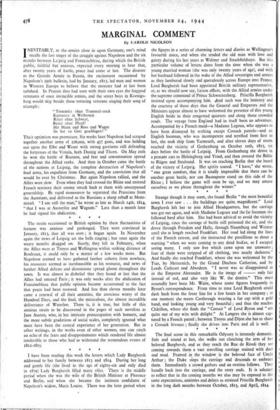* * * * I have been reading this week
the letters which Lady Burghersh addressed to her family between 1813 and 1814. During her long and gentle life (she lived to the age of eighty-six and only died in 1879) Lady Burghersh filled many roles. There is the middle period when she was the wife of the British Minister at Florence and Berlin, and when she became the intimate confidante of Napoleon's widow, Marie Louise. There was the later period when
she figures in a series of charming letters and diaries as Wellington's favourite niece, and when she tended the old man with love and gaiety during his last years at Walmer and Strathfieldsaye. But this particular volume of letters dates from the time when she was a young married woman (she was only twenty years of age), and with her husband followed in the wake of the Allied sovereigns and armies as they lumbered slowly and querulously across Europe into France. Lord Burghersh had been appointed British military representative, or, as we should now say, liaison officer, with the Allied armies under the supreme command of Prince Schwarzenberg. Priscilla Burghersh insisted upon accompanying him. land such was the leniency and the courtesy of those days that the General and Emperors and the Ministers appear almost to have welcomed the presence of this young English bride in their congested quarters and along those crowded roads. The voyage from England had in itself been an adventure. Accompanied by a French maid—a Madame Legoux, who appears to have been dismayed by nothing except Cossack patrols—and an English footman, who was incompetent and terrified from first to last, she took ship from Yarmouth, and after eleven days of storm reached the vicinity of Gothenburg on October Kith, 1813, six days before the battle of Leipzig. From Gothenburg she drove in a peasant cart to Helsingborg and Ystad, and then crossed the Baltic to Rugen and Stralsund. It was on reaching Berlin that she heard of the victory of Leipzig. Her spirits soared. " I have," she wrote, " one great comfort, that it is totally impossible that there can be another great battle, nor can Buonaparte stand on this side of the Rhine ; I believe the game will soon be up, and we may amuse
ourselves as we please throughout the winter." * * * *.


























 Previous page
Previous page